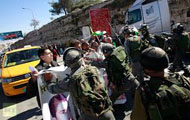
This week Palestinians were focused on the plight of Palestinian prisoners in Israeli jails. Demonstrations, sit-ins and marches took place throughout the West Bank and Jerusalem with scores of people injured by rubber- coated metal and live bullets and teargas inhalation. On February 22, clashes broke out after Friday noon prayers, including in Jerusalem’s Aqsa Mosque compound where protesters clashed with Israeli police.
Also on February 22, three prisoners on hunger strike, Ayman Sharawneh, Jaafar Izzedin and Tareq Qaadan were taken to Israeli hospitals after a dangerous deterioration in their health. Ezzedin and Qaadan, who were taken to the Assaf Harofeh Medical Center, have been on hunger strike for 87 days in protest against their administrative detention. Sharawneh has been on hunger strike for the most of 140 days after being re- arrested in the Shalit prisoner swap.
Most eyes were on Samer Issawi, however, the prisoner who has been without food for over 200 days. On February 21, the Israeli magistrate court in Jerusalem sentenced Issawi to eight months in prisoner on charges of leaving Jerusalem, which is a violation of the terms of his amnesty granted in the prisoner exchange deal. Issawi still must face a military committee as well, which could imprison him for 20 years, his original sentence before he was released.
Issawi said he was determined to continue his hunger strike regardless of the court decision, saying he would reach ‘victory or martyrdom.”
Another prisoner who has raised concern among Palestinians is Dirar Abu Sisi, who was abducted from a train in the Ukraine in 2011 and has been in isolation in Israeli prisons ever since. The Palestinian Prisoner Club said on February 17 that after two years of solitary confinement Abu Sisi is beginning to lose his ability to recall language and has speech impairments. The Club also said Abu Sisi is suffering from a number of health problems.
Israel also continued to distribute home demolitions in the West Bank this week. On February 21, Israeli occupation forces handed four Palestinians orders to evict their homes in Beit Dajan, a village east of Nablus. Several orders were also handed to residents of Silwan.
A day earlier, on February 20, armed Jewish settlers attacked Qusra, a village south of Nablus, torching six cars. Settlement monitor for the northern West Bank Ghassan Daghlas, said dozens of residents of the Esh Kodesh settlement outpost entered Qusra firing heavily and setting fire to the cars.
Meanwhile, the Hamas de facto government in Gaza is dealing with a new Egyptian policy of flooding smuggling tunnels between Gaza and Egypt with waste water in order to shut them down.
On February 20, Hamas official Alaa’ Rafati said Egypt's crackdown on smuggling tunnels “will not succeed unless alternatives to importing produce are provided.” The tunnels have been used for years to import goods into Gaza that are not allowed or easily brought in due to the Israeli siege on the Strip.
This week voter registration was successfully completed in the West Bank and Gaza. The stations were officially closed on February 20. CEC head Hanna Nasser said 451,000 people had registered for upcoming elections – 100,000 in the West Bank and 351,000 in Gaza.
Still, Palestinian officials say Israel is already impeding the election process by blocking the delivery of electoral registers from the Gaza Strip to the West Bank at the Erez crossing.
According to the sources, Israel has not given the Palestinian side approval to transfer the electoral rolls. The Palestinians have been in contact with the Israelis for 10 days to work out the transfer, but the Israelis are still “haggling,” one official said.
At the political level, a delegation of Palestinian politicians travelled to Washington this week to meet with US officials. On February 21, chief negotiator and PLO member Saeb Erekat and Fatah official Mohammed Shtayeh were to meet in Washington with US Secretary of State John Kerry to outline the Palestinian position ahead of President Barack Obama’s visit to the region next month.
Shtayyeh made it clear on February 22 that the Palestinian leadership is ready to negotiate but only if Israel stops building illegal settlements and releases Palestinian prisoners. Shtayyeh was responding to reports that Israeli Prime Minister Benjamin Netanyahu planned to resume talks with the PLO within three months of forming a new government.
Days earlier, on February 19, Netanyahu said Israel must “make every effort to promote a responsible peace process with the Palestinians,” adding that he hoped for a resumption of suspended talks. Tzipi Livni is slated to join the coalition and become the Israeli government’s exclusive negotiator with the Palestinians.
It looks as if Hamas is holding negotiations of its own with Israel. After rumors swirled around Hamas-Israeli talks in Cairo, senior Hamas official Khalil Al Hayya confirmed on February 17 that the movement was holding indirect talks with Israel over the implementation of a ceasefire deal, but insisted that that no political negotiations were taking place. Al Hayya said the agenda of the talks included Israel permitting Egypt to open its Rafah border with Gaza and the export of Gaza's agricultural products to Israel. Al Hayya was seconded by Hamas leader Mahmoud Al Zahhar who said the movement was holding ‘humanitarian’ negotiations with Israel which did not include “issues of the homeland.”
Finally, Hamas and Fatah delegations are set to meet with other factions on February 27 in Cairo to discuss mechanisms for forming a unity government.







